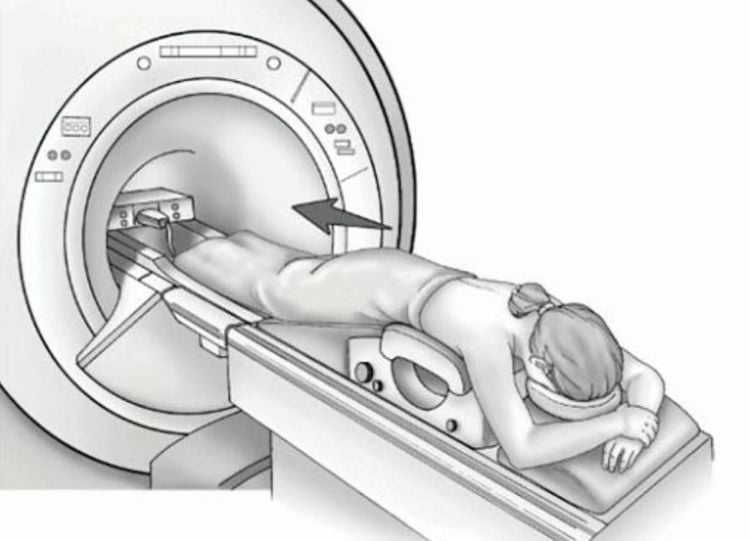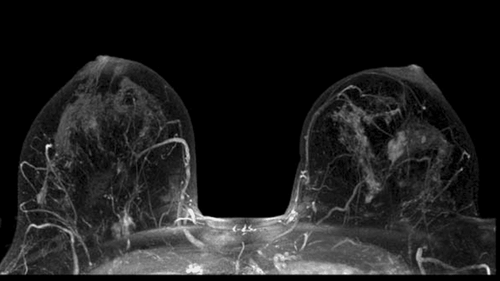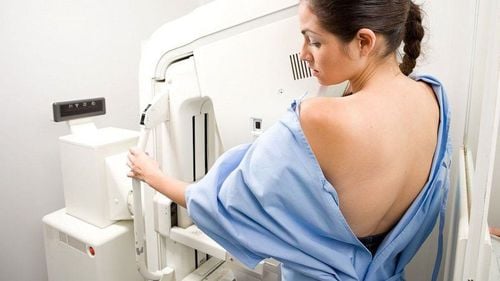This is an automatically translated article.
The article was professionally consulted by Specialist Doctor I Nguyen Truong Duc - Radiographer - Department of Diagnostic Imaging and Nuclear Medicine - Vinmec Times City International General Hospital.Breast cancer is one of the dangerous diseases that seriously affects the quality of life of women. The disease has no obvious symptoms that make treatment difficult. Magnetic resonance imaging (MRI) of the breast allows the diagnosis of lesions and tumors in the mammary glands. What risks does a mammogram pose?
1. Understanding Magnetic Resonance of the Mammary gland
An MRI of the breast is also known as magnetic resonance mammography. This technique is a subclinical imaging modality to detect abnormalities in the mammary gland. During the scan, many images of breast tissue are obtained, providing detailed images of the mammary glands.Breast MRI is recommended for women in their 40s. Magnetic resonance imaging is indicated when a patient has a biopsy and has cancer results. In the case of breast cancer screening, women may be offered a combination of breast MRI and mammography.

Chụp MRI tuyến vú giúp tầm soát ung thư vú
2. Risks
While X-rays or bone scans that use X-rays or radionuclides pose some risks, an MRI of the breast is relatively safe. This technique is not invasive. However, in certain cases, a mammogram can cause side effects. Specifically:Allergy to contrast agent: During the MRI scan, the doctor will prescribe contrast injection to bring accurate and clear image results. Some people have an allergic reaction to this drug, especially in patients with kidney disease.
False-positive result: This condition is understood as mammary resonance to help suspect the location of the lesion, but when doing other tests, the results are positive. False-positive results make patients worry and worry unnecessarily.
3. Attention when taking breast MRI
Before conducting a mammogram, you need to have a specific plan. Including:Actively schedule magnetic resonance imaging: The most appropriate time for a mammogram is the beginning of the menstrual cycle. Women in perimenopause can schedule scans on any day of their menstrual cycle, specifically from day 3 to day 14 of the cycle.
Be sure to tell your doctor about your allergy history: Contrast drugs can cause allergies and complications in some people. Therefore, if the patient is allergic, the doctor may not inject the contrast agent.
Patients with kidney disease may not be indicated for mammography. Because the component in the contrast agent contains gadolinium, it will cause unwanted effects for the patient.
Women who are in pregnancy also need to consider a mammogram. Because gadolinium will negatively affect the fetus.
Similarly, breastfeeding mothers also need to be discussed carefully before the doctor makes a decision to have magnetic resonance imaging. The mother should stop breastfeeding 2 to 3 days before the scan. Breast milk can be pumped and frozen for later use by infants. Contrast can be eliminated through breast milk. Therefore, after the MRI, mothers should remove this milk.
Absolutely avoid bringing jewelry, metal equipment into the shooting room. These devices may be damaged during shooting.

Mẹ bỉm sữa nên ngừng cho trẻ bú 2 ngày đến 3 ngày trước khi chụp MRI
4. Breast MRI procedure
Like any medical procedure, when taking a mammogram, the patient is provided with full information about the procedure, risks, and necessary precautions.The photographer is instructed to remove jewelry, metal equipment, change into hospital clothes. If you are a person with claustrophobia or hyperactive children, you need to notify your doctor to be prescribed a sedative injection. Medicines can help reduce anxiety and stress. The doctor administers intravenous contrast injection to the patient to increase the diagnostic efficiency. Lying on the table: The patient lies face down on the padded scanning table. The chest part fits into an empty hole in the table, which houses the part that generates the magnetic field signals from the MRI machine. Then the whole scanning table will slide into the central circular hole of the machine. A magnetic field will be emitted from the magnetic resonance machine and shined directly on the body. The patient's senses will not be able to perceive these waves, but the sound emitted by the scanner can be heard. Some patients may need to wear headphones to reduce noise. The patient should lie still, not move, and maintain a stable breathing rate. Usually, the time for mammography can last from 30 minutes to an hour depending on the complex location of the lesion.

Quy trình chụp MRI tuyến vú có thể kéo dài 30 phút
Examination and consultation with an oncologist. Breast cancer screening by bilateral breast ultrasound and mammogram. Up to now, Vinmec has become a prestigious address in breast cancer screening with:
Team of highly qualified and experienced doctors. Comprehensive professional cooperation with domestic and international hospitals: Singapore, Japan, USA, etc. Comprehensive treatment and care for patients, multi-specialty coordination towards individualizing each patient. Having a full range of specialized facilities to diagnose the disease and stage it before treatment: Endoscopy, CT scan, PET-CT scan, MRI, histopathological diagnosis, gene-cell testing, .. There are full range of mainstream cancer treatment methods: surgery, radiation therapy, chemotherapy, stem cell transplant...
Please dial HOTLINE for more information or register for an appointment HERE. Download MyVinmec app to make appointments faster and to manage your bookings easily.













